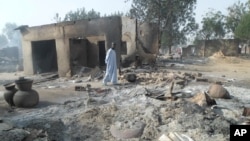Rights group Amnesty International is denouncing the high price paid by populations in West and Central Africa in the fight against terrorism. In its annual global report the group also emphasized there has been some progress in the region regarding human rights.
Amnesty International said populations in West and Central Africa have suffered directly from the fight against terrorism.
In Cameroon, Niger, Chad and Nigeria, entire towns have sometimes been caught in the crossfire between government forces and Boko Haram militants, resulting in hundreds of deaths.
People in those countries also feel the effects of anti-terrorism laws, such as one passed in Cameroon in 2014 that gives extra powers to authorities and has led to arbitrary detentions, notably of human right activists, children and journalists.
Speaking at the regional launch in Ivory Coast, West and Central Africa’s campaign deputy director Samira Daoud said that "it is imperative that governments fight terrorism adequately by protecting the population and certainly not by sacrificing freedoms and the lives of some communities."
But the organization also highlighted progress for human rights in the region.
"In Togo, torture has been criminalized," said Daoud. "Also, Ivory Coast has abolished the death penalty, which is extraordinary progress for the region," she added, also mentioning some progress in Mauritania with slavery now considered a crime against humanity.
With regard to international justice, Daoud said the organization of the trial of former Chadian leader Hissène Habré in Senegal was a step in the right direction, but expressed concerns over the growing criticism of the International Criminal Court, or ICC, by a certain number of African countries.
She said that Amnesty considered the ICC to be the court of last resort.
"One can be credible in criticizing the ICC if one is capable on a national or regional level to fight impunity. It is fundamental that justice be done, wherever that is," she said.
Regarding the future, Daoud said Amnesty hopes to make progress with Burkina Faso on eliminating the death penalty and ending forced child marriage.






